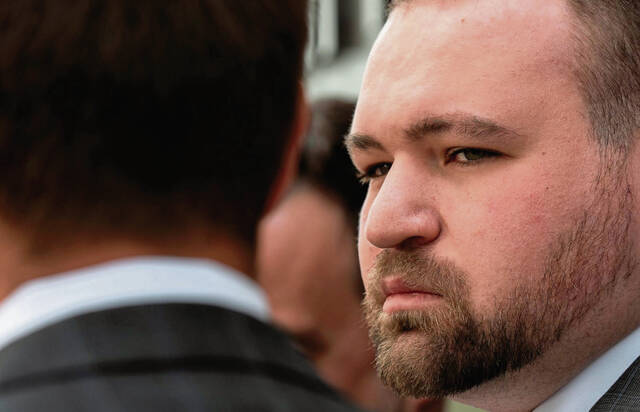The day Kenzie Houk was killed, her ex-boyfriend, who, her family said, had once thrown her down a set of stairs and repeatedly threatened to kill her, offered to take a polygraph exam.
But the state police investigating the shotgun murder didn’t take him up on it.
“That determination is not mine,” retired Cpl. Jeffrey Martin, one of the lead investigators in the Feb. 20, 2009, investigation told a jury Friday.
It was a common refrain throughout his more than four hours on the witness stand.
Martin is one of four state troopers who were sued by Jordan Brown for malicious prosecution and fabrication of evidence in 2020 — 11 years after they charged him with Houk’s death.
Brown was 11 years old when the state police arrested him, alleging that he used a 20-gauge youth model shotgun to kill Houk, who was engaged to his father.
Houk’s body was found in her bed that morning at the family’s rented farmhouse in Lawrence County when a tree-cutting crew saw her 4-year-old daughter standing in the front doorway crying.
Brown was arrested the next day and remained incarcerated until he turned 18.
Although he was adjudicated delinquent of first-degree murder, in July 2018, the state Supreme Court overturned his conviction, saying that there was insufficient evidence to have found him guilty beyond a reasonable doubt.
Brown sued retired troopers Janice Wilson, Jeffrey Martin, Troy Steinheiser and Robert McGraw, who has since died.
The civil trial, before U.S. District Judge W. Scott Hardy, began on Wednesday in federal court.
The first two days of the trial included extensive testimony on the four formal statements provided to troopers that day by Houk’s 7-year-old daughter, Jenessa. In the first two, the girl recounted that nothing out of the ordinary happened that morning when she and Brown left for school.
By the third interview at 11:30 p.m., Jenessa said she’d seen Brown carrying two long guns down and up the steps that day. And by the fourth one — the only one recorded — she claimed she heard a “big boom,” that sounded like a gunshot.
Brown’s attorneys have alleged that the troopers continued questioning Jenessa that day until she said what they wanted to hear.
During his testimony on Friday, Martin said that wasn’t true.
“I think you’re insinuating we made up things, and we didn’t,” he said.
Martin, the first of the defendants to testify, told the jury that he was one of the detectives who signed the affidavit of probable cause to charge Brown.
But, he said, decisions made in homicide cases like that one came from the supervisors on the state police major case team.
“I don’t have any command decisions,” Martin said. “This ‘lead investigator’ sounds really good, but homicides are treated entirely differently by the state police.
“I basically just become an investigator.”
In the early hours of the investigation into who killed Houk, Martin said, her family and friends told troopers that the only person they knew of who could have hurt her was her ex-boyfriend.
Houk had broken up with the man in November 2007, and then obtained a restraining order against him in February 2008.
As part of her allegations in the protection from abuse paperwork, Houk said her ex repeatedly called her mother and threatened to kill Houk and her family.
“He has threatened to hire someone to hurt me several times,” Houk wrote.
During his testimony, Martin acknowledged that Houk’s mother, Deborah Houk, also shared voicemails of those messages to troopers that day.
Martin said that those allegations were important pieces of information, and that the ex-boyfriend was investigated.
Troopers went out to find the ex that day and returned him to the New Castle barracks.
“I believe someone in our unit knew [him],” Martin testified.
Then, he further clarified Houk’s ex-boyfriend went to high school with Cpl. William Maitland.
“He was my supervisor at the time,” Martin said.
He did not elaborate further on Maitland’s relationship with the ex-boyfriend.
Maitland’s name is listed as the supervisor on a number of the police reports completed in the investigation, including dispatching troopers to conduct interviews and search the school Brown attended.
It is unclear if Maitland will testify, but his name does appear on the defense witness list as a person who may be called during the liability phase of the trial.
While the ex-boyfriend was at the barracks, another man called him to tell him Houk was dead.
That man was never interviewed, Martin said. In fact, Martin acknowledged a number of people identified during the investigation who could have provided information about the ex-boyfriend that day were not formally questioned.
They included several people with whom the ex-boyfriend was said to be hanging out with at the time: the man’s father, who provided his alibi for him; or a man at the German Culture Club in New Castle, who said he kicked the ex out of the establishment the night before because the Houks were there.
“Based on our investigation at that time, that’s not where the evidence led us,” Martin said.
Troopers also obtained a soil sample from the ex-boyfriend’s pickup truck that day, but it was never tested to see if it was a match to the long, dirt driveway at the house where Houk was killed.
When the ex-boyfriend was questioned, he told police he owned a rifle, and that he kept it in his father’s safe.
When asked if investigators followed up on that, Martin said they did not.
“This wasn’t a homicide committed with a rifle,” Martin said.
Brown’s attorney, Alec Wright, countered with, “Is that to be taken at face value?”
And, Wright continued, if the ex-boyfriend’s alibi held up, isn’t it possible he hired someone to kill Houk like he’d threatened to do?
“He could have,” Martin answered. “I don’t believe that.”
At some point later that day, Martin said, Brown became a suspect based on how Houk died. The autopsy showed she was killed by a shotgun blast, and troopers found a 20-gauge shotgun in the boy’s room that smelled as if it had been freshly fired.
“There was a multitude of things,” Martin said.
By the time the affidavit of probable cause for a search warrant for Brown’s clothes was signed at 12:25 a.m., Martin said, Harvey was no longer a person of interest.
Martin told the jury that then-Lawrence County District Attorney John Bongivengo was in the state police barracks conference room that night as they worked and approved the affidavit.
He also approved the arrest, Martin said.
“This decision to arrest was not my decision,” he said.
But, Wright countered, “you signed the affidavit, true?”
“Yes,” Martin answered.
“That’s the document you signed to put an 11-year-old boy in handcuffs?” Wright pushed.
“Yes.”
During his testimony, Martin said he didn’t recall what Brown looked like the night he was arrested.
Wright then displayed for the jury a picture of Brown from that time in his Mohawk’s white-and-red football uniform. Kneeling on the ground with his black helmet in front of him, Brown’s round face lit up with a wide smile.
Several seconds after Wright had moved on from that question, the image remained on the courtroom screens.
It was only after state police attorney Nicole Boland objected that it was removed.
On cross-examination, Martin told the jury that the district attorney was responsible for the paperwork that night.
“Did you lie in any document?” Boland asked.
“No,” Martin said.
“Did you fabricate any evidence?” she continued.
“Absolutely not.”
“Did you put words in anyone’s mouth?” Boland asked.
“No.”
Later, she concluded with, “Was this a rush to judgment?”
Martin answered, “No.”








